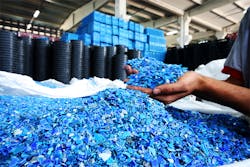US plastics resin producers commit to plastics recovery goal
The American Chemistry Council (ACC) Plastics Division announced three goals that reflect U.S. plastics resin producers’ commitment to recycle plastic packaging used in the U.S. by 2040 and to further enhance plastic pellet stewardship by 2022. Members of ACC’s Plastics Division have set the following goals for capturing, recycling, and recovering plastics:
- 100 percent of plastics packaging is reused, recycled or recovered by 2040.
- 100 percent of plastics packaging is recyclable or recoverable by 2030.
- 100 percent of the U.S. manufacturing sites operated byACC’s Plastics Division members will participate in Operation Clean Sweep-Blue by 2020, with all of their manufacturing sites across North America involved by 2022.
Plastic resin producers plan to focus on six key areas: Designing new products; developing new technologies; making it easier for more consumers to participate in recycling and recovery programs; expanding the types of plastics collected; aligning products with key end markets and expanding awareness that used plastics are valuable.
Sartorius Stedim Biotech and Penn State University partner on fermentation research facility
Sartorius Stedim Biotech and Penn State University entered into a partnership to advance teaching and research in biotechnology. This relationship will support the education and preparation of the next generation of biotechnology leaders, the entities said in a press release. Sartorius’ investment will be to enhance a fermentation facility that will play a significant role in Penn State’s Center of Excellence in Industrial Biotechnology (CoEIB). Sartorius will provide state-of-the-art fermentation technologies, and a central laboratory within the fermentation facility will be named the Sartorius Fermentation Gallery.
CPI and National Composites Centre collaborate to find future lightweight materials
The Centre for Process Innovation (CPI) is collaborating with the National Composites Centre (NCC) to develop the next generation of graphene-enhanced materials. The project, known as Enhanced Structural Composites (ECOi), is evaluating the functionality and applicability of these materials. Graphene conducts electricity and is extremely strong, but it is also thin, lightweight and stretchable. When graphene is combined with any other material, this creates a "graphene- composite" — a new material with unique properties. The ECOi project will identify multiple grades of graphene and optimize them for incorporation into a resin. Materials identified within the ECOi project will be subject to a series of complex experiments designed to assess activity and function, to ensure it is suited to the desired application.
New ASTM International standard supports use of metals in 3D printing
A new ASTM International standard supports the growing use of metals in additive manufacturing (3D printing) to make aerospace parts and medical devices. The standardized practice (soon to be published as F3303) outlines ways to qualify machines and processes that help build parts using laser or electron-beam powder bed fusion, notes ASTM member Amir Farzadfar, Materials and Process Engineer for Additive Manufacturing at Corning Inc. The standard also outlines the related steps needed to configure and control digital data. ASTM International recently announced its new partners – EWI, Auburn University, and NASA – for an Additive Manufacturing Center of Excellence, which will further support standards development and related efforts in this area.
CPI expands services that assist companies exploring IoT
The Centre for Process Innovation (CPI) expanded the capabilities of its National Printable Electronics Centre to assist companies in exploiting the commercial opportunities offered by the Internet of Things (IoT). IoT’s ability to connect mainstream products via the cloud may be essential for electronics companies to develop new business models. CPI has new equipment and expertise that will enable companies to design, develop and demonstrate the manufacture of new concepts and participate in this area. The center includes a roll-to-roll machine that integrates thin film and conventional electronics onto flexible films. This upgrade allows the creation of rolls of thin, flexible inlays containing multiple electronic components.


